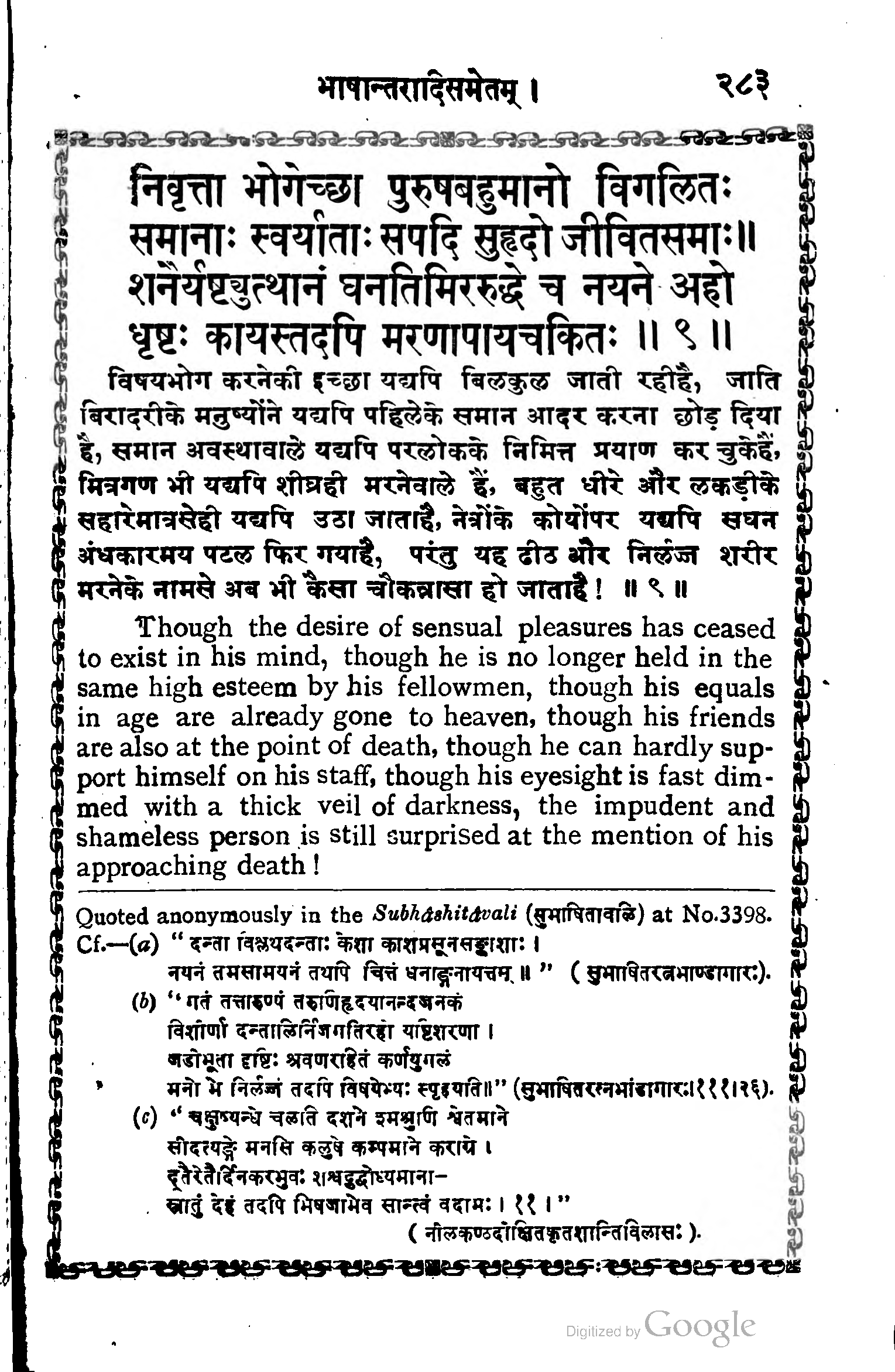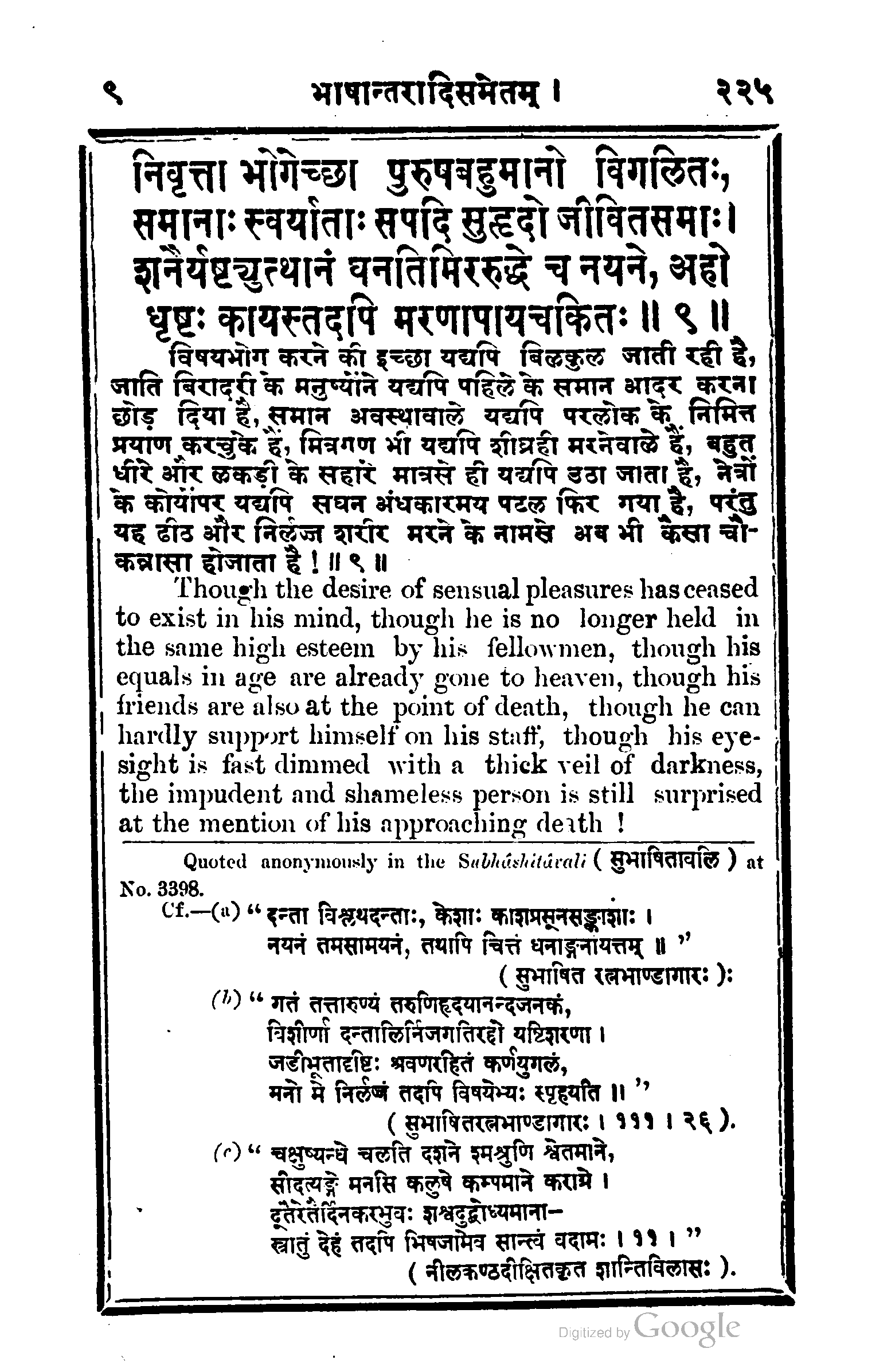Ryder
Brough
Tawney
Mādhavānanda
Telang
verse

Text (not proofread)
निवृता भोगेच्छा पुरुषबहुमानो विगलितः .
समानाः स्वर्याताः सपदि सुहृदो जीवितसमाः ।
शनैर्यष्ट्युत्थानं घनतिमिररुद्धे च नयने
अहो धृष्टः कायस्तदपि मरणापायचकितः ॥ ९ ॥
footnote

Text (not proofread)
IX . ( 4 ) पुरुषबहु बहुपुरुष . T. ° नो वि ० ; ° नपिं ० . J. ० नोपि . K. N.
० तः ; ' ती . T. ( 6 ) ● समा :; ° तमाः . A. ( 0 ) ● ट ° ; यंधु ° ; C , यस्यु ● A.
● यँस्यो ● M. ● रभ्यु ° . J. ( d ) बृष्टः ; दुष्ट :. T. J. K. Bo . भ्रष्टः K. ( 82 ) .
दृष्टः . P. मूढः . N. ० णा ० ; ० णो ० . K. ० पाय ० ० याप ° A. G. पात .
Bo.n.
endnote

Text (not proofread)
St. IX . -पुरुषबहुमानः = Rāmarshi says पुरुषसंबन्धी पुरुषाणां यूनां यो भव
तोत्यर्थः स बहुमानी भूरिरहंकारः स विगलितः भ्रष्टः वृद्धी हि निरहंकारं वक्ति
Å xù ‹ ƒ :. The other commentary explains it to mean respect
among men , which I think better . The alternative of taking
5 as a vocative I do not think a good one . The commentary
comments on जीवितसमा : thus जीवितं समं पूर्णे येषां अथवा जीवनतुल्यास्तै दुईद
स्तिष्ठन्तु स्त्रियन्तां वा तैः किमित्यर्थ :. Whence this last portion comes
does not appear ; for meaning of there is no authority that
I am aware of , and there is also a further difficulty , but not
quite insuperable , about the position of in the com
pound . Râmarshi has : simply , which is correct . Ramar
shi supplies स्वताः : with : and thus makes the line consist of
two statements . It would be better I think to take it as one
statement . समाना जीवितसमाः सुहृदः सपाद खर्याताः धृष्टः Ramarshi renders
by which is appropriate . But one of the other readings
would perhaps be preferable , as the meaning of can only
be got by some straining , and the ordinary sense of " bold " will
not suit here . S'ikhariņi .
Kosambi
verse

Text (not proofread)
निवृत्ता भोगेच्छा पुरुषबहुमानो विगलितः
समानाः स्वर्याताः सपदि सुहृदो जीवितसमाः
शनैर्यष्ट्युत्थानं घनतिमिररुद्धे च नयने
अहो धृष्टः कायस् तदपि मरणापायचकितः ॥ १५३ ॥
footnote

Text (not proofread)
153 ) Ms वपुषि ( for पुरुष ) . A Jic - बहुमानं ; W1.2.4 ° मानैर् A विगलितं ;
F1 . 4_Y3–6 . 4 T G_M24 [ 5 ] पि गलितः - 5 ) A2 स्वपदि ; Fam.v. संगति - ( for सपदि ) . - )
Ao − 2 E2−4 ( and Ec ) Hit X यद्युत्थानं ; D Fs Y 1 Hat यष्ट्योत्थानं ; Est यस्योत्थानं ; Eso
यस्य स्थानं ; F2 यात्युत्थानं ; J3 यष्ट्युतानं . C बजे ; Y : दुग्धे ; G1 -विद्धे ( for - रुवे ) . - – ) )
[ To avoid hiatus ] G1 M1 w - 3 [ 5 ] व्यहो ; G + त्वहो . A2 Eit Ha I दृष्ट : ; C भ्रष्ट ; DF6
J W Y24-7 G2.3 M 4. 6 दुष्टः ; X हृष्टः ; Y8 दक्षः ; T G5 मूढः ; G1 कष्टं ; G4 M1-3 कष्टः
( for धृष्टः ) . Escom . धृष्टः = निर्लज : Eot Y8 मरणोपाय ' ; F + m.v . मरणोपाय .
BIS . 3772 ( 1615 ) Bhartṛ . ed . Bohl . lith . ed . I Galan 3. 10. Haeb . 10 and 93 .
lith , ed . II . 9 ; SRB p . " 77. 44 ; SBH . 3398 ; SRH . 196. 23 ( Bh . ) ; SRK . p . 67.7
( Rasikajivana ) ; SU . 1013 ; SM , 1484 ; PMT , 288 ( Bh . ) ; SSD , 4 £ 8b ; SSV 1467 .

